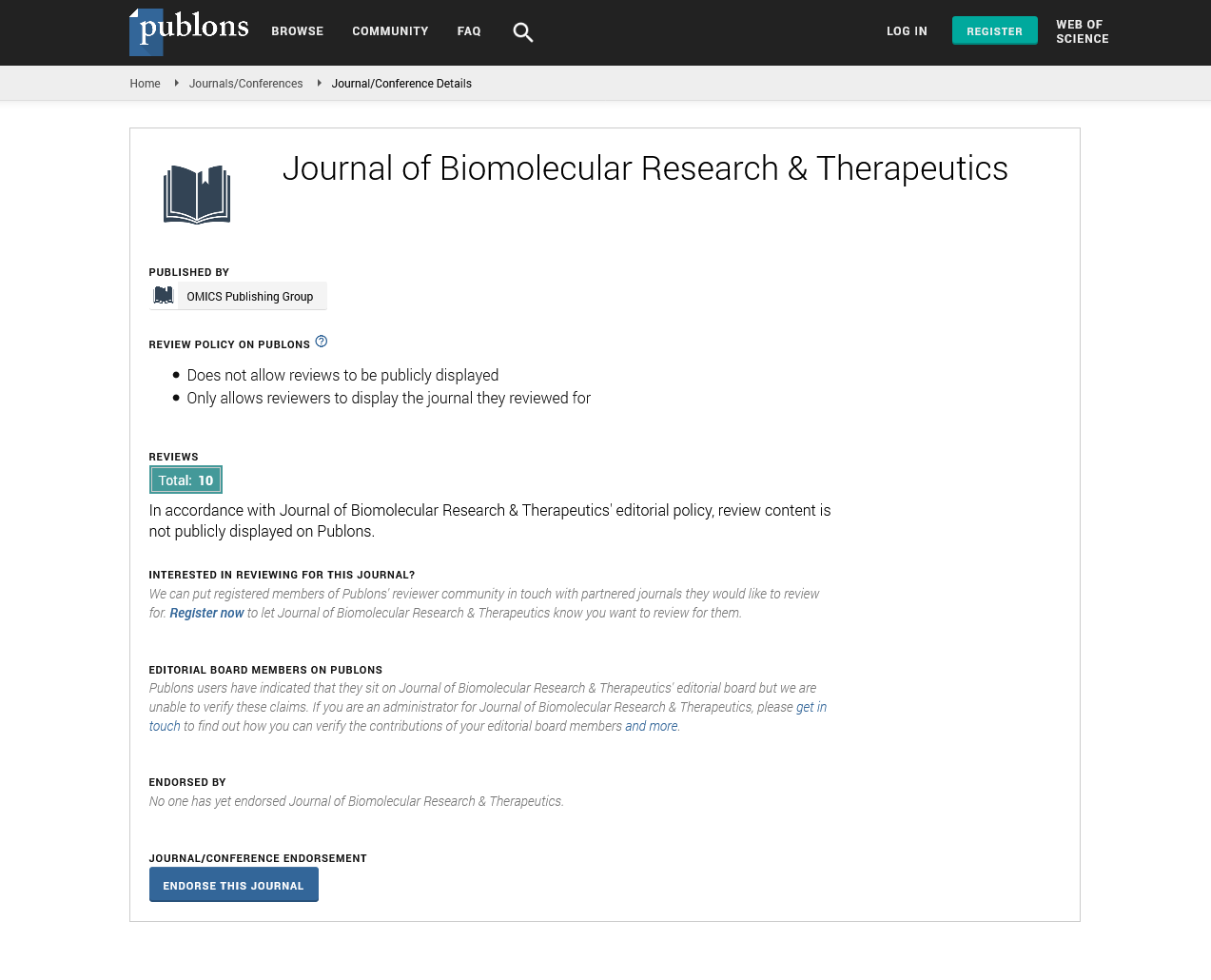Indexed In
- Open J Gate
- Genamics JournalSeek
- ResearchBible
- Electronic Journals Library
- RefSeek
- Hamdard University
- EBSCO A-Z
- OCLC- WorldCat
- SWB online catalog
- Virtual Library of Biology (vifabio)
- Publons
- Euro Pub
- Google Scholar
Useful Links
Share This Page
Journal Flyer

Open Access Journals
- Agri and Aquaculture
- Biochemistry
- Bioinformatics & Systems Biology
- Business & Management
- Chemistry
- Clinical Sciences
- Engineering
- Food & Nutrition
- General Science
- Genetics & Molecular Biology
- Immunology & Microbiology
- Medical Sciences
- Neuroscience & Psychology
- Nursing & Health Care
- Pharmaceutical Sciences
Opinion - (2024) Volume 13, Issue 4
Lipid Therapy: Innovations and Applications in Modern Medicine
Nathaniel Cove*Received: 29-Jul-2024, Manuscript No. BOM-24-26743 ; Editor assigned: 01-Aug-2024, Pre QC No. BOM-24-26743 (PQ); Reviewed: 15-Aug-2024, QC No. BOM-24-26743 ; Revised: 22-Aug-2024, Manuscript No. BOM-24-26743 (R); Published: 30-Aug-2024, DOI: 10.35248/2167-7956.24.13.400
Description
Lipid therapy is an emerging field in modern medicine that uses the unique properties of lipids for therapeutic purposes. Lipids, which include fats, oils, waxes, and certain vitamins, lead significant roles in cell structure, energy storage, and signaling. Their versatility and biocompatibility make them ideal candidates for various medical applications, from drug delivery systems to treatments for metabolic disorders. This article describes the innovations and applications of lipid therapy, highlighting its significant to revolutionize healthcare.
Innovations in lipid therapy
One of the most significant advancements in lipid therapy is the development of lipid-based drug delivery systems. These systems enhance the delivery and efficacy of therapeutic agents, particularly those that are poorly water-soluble. Liposomes, Solid Lipid Nanoparticles (SLNs), and nanoemulsions are among the most widely studied lipid-based carriers.
Liposomes are spherical vesicles composed of lipid bilayers that can encapsulate both hydrophilic and hydrophobic drugs. They protect the drug from degradation, improve its bioavailability, and enable targeted delivery to specific tissues or cells. This targeting reduces side effects and enhances therapeutic outcomes.
Solid Lipid Nanoparticles (SLNs) offer another promising approach. They are composed of a solid lipid core stabilized by surfactants, providing a matrix for drug incorporation. SLNs improve drug stability, control release rates, and enhance drug penetration into target tissues. They have shown significant in delivering anticancer drugs, antibiotics, and gene therapies.
Gene therapy and lipid nanoparticles: Lipid Nanoparticles (LNPs) have revolutionized gene therapy, particularly with the advent of messenger Ribonucleic Acid (mRNA)-based vaccines and therapeutics. LNPs protect nucleic acids from degradation and facilitate their delivery into cells, enabling effective gene expression.
Beyond vaccines, LNPs are being investigated for the delivery of small interfering Ribonucleic Acid (siRNA), antisense oligonucleotides, and Clustered Regularly Interspaced Short Palindromic Repeats (CRISPR-Cas9) components for gene editing. These approaches influence the capability for treating genetic disorders, cancers, and viral infections.
Lipid-based therapeutics for metabolic disorders: Lipid therapy is also making strides in the treatment of metabolic disorders, such as hyperlipidemia, obesity, and diabetes. Innovative lipid- based drugs and formulations are being developed to modulate lipid metabolism and improve metabolic health.
Lipid-based anti-inflammatory therapies: Inflammation is a common feature of many chronic diseases, including cardiovascular diseases, autoimmune disorders, and neurodegenerative conditions. Lipid mediators, such as resolvins and protectins, derived from omega-3 fatty acids, lead a significant role in resolving inflammation.
Research into lipid-based anti-inflammatory therapies is advancing, with synthetic analogs of these lipid mediators being developed to treat inflammatory diseases. These therapies aim to use the natural resolution pathways of inflammation, providing a novel approach to managing chronic inflammatory conditions.
Applications in modern medicine
Lipid-based delivery systems are transforming cancer therapy by improving the delivery of chemotherapeutic agents and reducing their toxicity. Liposomal formulations of drugs like Doxorubicin (Doxil) and Daunorubicin (DaunoXome) have been approved for clinical use, demonstrating enhanced efficacy and reduced side effects.
Neurological disorders: Lipid-based therapies are being explored for the treatment of neurological disorders, such as Alzheimer's disease, Parkinson's disease, and multiple sclerosis. Lipid nanoparticles can cross the blood-brain barrier, facilitating the delivery of therapeutic agents to the central nervous system.
Infectious diseases: The success of lipid-based mRNA vaccines against COVID-19 has opened new avenues for the prevention and treatment of infectious diseases. Lipid nanoparticles can deliver nucleic acids, proteins, or small molecules to target pathogens, offering a versatile platform for vaccine development and antimicrobial therapy.
Conclusion
Lipid therapy represents a frontier in modern medicine, offering innovative solutions for drug delivery, gene therapy, metabolic disorders, and inflammatory diseases. The versatility, biocompatibility, and efficacy of lipid-based systems underscore their importance to revolutionize healthcare. As research continues to advance, lipid therapy is poised to lead an increasingly vital role in addressing some of the most pressing medical challenges of our time.
Citation: Cove N (2024). Lipid Therapy: Innovations and Applications in Modern Medicine. J Biomol Res Ther. 13:400.
Copyright: © 2024 Cove N. This is an open-access article distributed under the terms of the Creative Commons Attribution License, which permits unrestricted use, distribution, and reproduction in any medium, provided the original author and source are credited.

